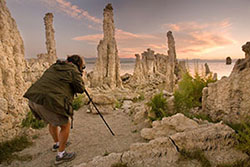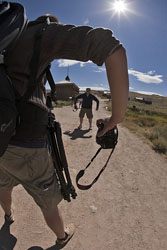
|
|
|||||
|
Bodie Ghost Town and Mono Lake Photography Workshop
|
Photos from the last workshop
|
From Mono Lake, we will spend the afternoon photographing the ghost town of Bodie. In the late 1800s, the town of Bodie was a thriving outpost in the search for gold, and its more remote location aided its reputation for lawlessness and mayhem. The early 1900s saw a severe decline in population, and ultimately the town was abandoned. Now, thanks to preservation efforts from the State of California, the town is in a protected state of "arrested decay" and a true photographer's playground. You will have ample time to wander the area and capture a true piece of Americana!
We will return to Mono Lake for an evening shoot. With the height of the Sierra limiting evening light from the west, Mono is the best option for capturing a memorable sunset. It's also the perfect way to draw from all you've learned throughout the workshop, and capture one last set of memorable images. All of our workshops are designed to focus on helping students work on the areas of photography that is most important to them. From camera settings and composition, to
the use of filters to properly balance tricky exposures...our first priority is providing students with an opportunity to learn. We want you to go home with knowledge that will benefit you
every time you take out your camera.
What is Required
Lodging, Meals & Directions
Lodging and meals are not included. Suggested lodging is at the Lake View Lodge or Ellery Lake Campground. PLEASE NOTE: The Lodge books quickly this time of year, and the campground is an alternate option for you. We will take a break mid-day, each day, for lunch and rest. There are many restaurants in the area as well as for dinner. What's Included/Not Included
What's Included in Your Workshop:
What's not included
Safety, Confidence, Being Prepared
Aperture Academy is a professional organization dedicated to safe, quality, positive experiences for our students, and responsible stewardship for the breathtaking locations and beautiful wildlife we enjoy at every workshop. We work with the United States Department of Interior, the National Park Service, and the US Forestry Service to obtain all the proper permits to operate safely, conscientiously, and legally. We carry much more than the required minimum of insurance, and our skilled instructors are certified as Wilderness First Responders, in CPR, as well as in the Leave No Trace Outdoor Ethics program. And, have we mentioned that each is an accomplished, successful professional photographer? Every "ApCad" member is dedicated to ensuring our students receive the best care and guidance possible, so each of them has the opportunity to get the most remarkable, enjoyable, and enriching photography experience available anywhere in the world. What to Bring
Workshop FAQs
:: What should I expect? :: All workshops are designed to help you learn how to take better photographs and offer a complete immersion into digital landscape and/or wildlife photography. You will learn important photography techniques such as how to properly expose a composition, when to use a filter for best effect, and how to understand and adjust camera settings for optimum results. :: Why only Digital? :: Digital photography offers unique opportunities for in-field photography workshops. By reviewing captured images as soon as they happen, we can examine exposure, composition and histograms, and instantly learn what works--and what doesn't. :: What should I bring? What is required? ::
:: What kind, and how much, equipment should I bring? :: Bring it all if you can! You never know what you might see. On many workshops we focus on landscape photos, but you never know when wildlife might enter the scene and provide the perfect opportunity to photograph them in their natural habitat. It's always better to go into the field with too much gear, rather than miss an opportunity because of not enough equipment. :: Is transportation provided? :: Each student is responsible for their own transportation during the workshop. :: Can a non-photographer friend or spouse attend the workshop? :: Non-photographer friends and or spouses are welcome to attend but will be liable for their transportation. For more information, please contact the Aperture Academy staff. :: Does weather ever alter or cancel events? :: Only if conditions pose a safety risk. Often, poor weather can make for dramatic photographic opportunities, so if rain is forecasted, pack a light jacket or rain poncho and bring something to keep your camera dry (a hotel shower cap is ideal). :: What happens if I have to cancel? :: Because of the limited number of workshops and availability of one-on-one instruction sessions, once we schedule a spot, it won't be available for anyone else, therefore we can not offer a refund unless the cancellation is 90 days before the workshop date. This policy is necessary to assure us that those who sign up are serious about the adventure and will not back out, ruining the opportunity for someone else. :: Be prepared to take better photographs! :: These workshops will help you develop skills, learn techniques and get to know your camera and equipment like never before. As a bonus, you will have a fun time and build friendships while learning to improve your photography technically. The result? You'll be capable of producing photographs as beautiful as any professional! |
|
 |
Other Cool Stuff→ Past Workshop Photos → 72dpi.com → How-To Articles → Photographer of the Month |
 |
Contact Us→ Contact Us → About Us → Site Map |
© 2009-2024 Aperture Academy, Inc.
 Highway 395 parallels the Eastern Sierra mountains, also known as the "range of light", and provides for some of the most amazing photographic opportunities in California.
Highway 395 parallels the Eastern Sierra mountains, also known as the "range of light", and provides for some of the most amazing photographic opportunities in California.
 Join us for this two-day workshop in the high desert of Eastern California, visiting exciting locations such as historical Bodie, Mono Lake, and Convict Lake. In the morning, we will begin this workshop by photographing the sunrise over the surreal tufa formations of Mono Lake, one of the most recognizable and iconic locations for landscape photography in the Western United States.
Join us for this two-day workshop in the high desert of Eastern California, visiting exciting locations such as historical Bodie, Mono Lake, and Convict Lake. In the morning, we will begin this workshop by photographing the sunrise over the surreal tufa formations of Mono Lake, one of the most recognizable and iconic locations for landscape photography in the Western United States.

 The late afternoon will be spent photographing one or two of the many lakes that lay at the foot of the Eastern Sierra, and are a short drive from highway 395. Weather in this
section of California is unpredictable and often amazing. It is not uncommon for late afternoon thunderstorms to roll into the area, which creates very dramatic skies.
The late afternoon will be spent photographing one or two of the many lakes that lay at the foot of the Eastern Sierra, and are a short drive from highway 395. Weather in this
section of California is unpredictable and often amazing. It is not uncommon for late afternoon thunderstorms to roll into the area, which creates very dramatic skies.





